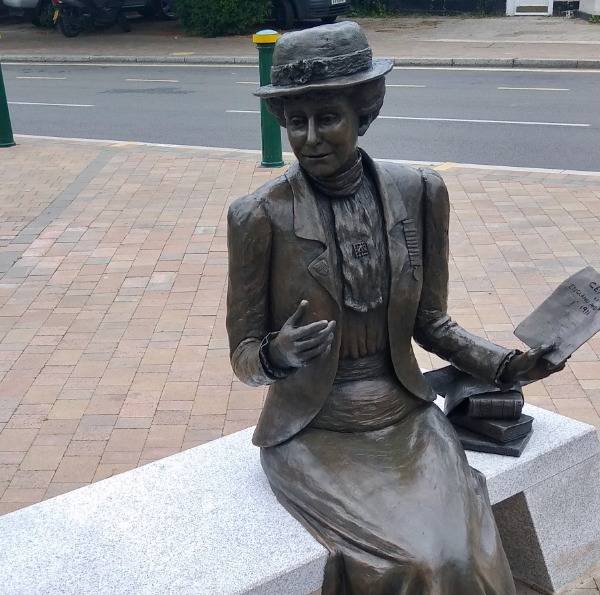-a1.jpg) I’m not usually keen on counter-factual history, but sometimes I wonder how Mitt Romney might have fared in his bid to be president in November 2012 if Matt Stone and Trey Parker hadn’t opened The Book of Mormon on Broadway in March 2011. The musical won nine Tony Awards, and, a year after opening, it was still sold out five months in advance. But it’s surely just coincidence that every state in which it has played – New York, Colorado, California, Illinois – went for Obama and not for America’s most famous Mormon (except for the Osmonds).
I’m not usually keen on counter-factual history, but sometimes I wonder how Mitt Romney might have fared in his bid to be president in November 2012 if Matt Stone and Trey Parker hadn’t opened The Book of Mormon on Broadway in March 2011. The musical won nine Tony Awards, and, a year after opening, it was still sold out five months in advance. But it’s surely just coincidence that every state in which it has played – New York, Colorado, California, Illinois – went for Obama and not for America’s most famous Mormon (except for the Osmonds).
Parker and Stone have form for tackling religion, along with demented politics, high finance and any other sacred cow grazing nearby. South Park has cheerfully taken on every religion, from Islam to the famously litigious Scientologists. They have always been equal-opportunities offenders, never afraid to attack any taboo. Yet there is always a streak of sweetness lurking beneath Cartman, Kyle and the rest, which softens the satire to the point where it’s funny rather than cruel.
And The Book of Mormon has succeeded in precisely the same way. It is an intensely affectionate mockery of the sheer batshittery which underpins a religion that many of us know little about. One song in the first act, “All American Prophet”, focuses on the founding myth of Mormonism:
“You all know the Bible is made of testaments old and new
You’ve been told it’s just those two parts, or only one if you’re a Jew
But what if I were to tell you – there’s a fresh third part out there
Which was found by a hip new prophet who had a little ... Donny Osmond flair?”
And in the second act, “I Believe” is all about the importance of uncritical faith and sticking to religious rules:
“And I believe that the current President of the Church, Thomas Monson, speaks directly to God
I am a Mormon!
And, dang it, a Mormon just believes!”
At the same point in the next verse, Elder Price will cheerfully tell us that he also believes that in 1978 God changed his mind about black people. And in his dream of hell, he’s tormented not just by visions of Hitler and Stalin, but also by dancing cups of coffee – caffeine being off-limits to Mormons.
The Book of Mormon is musically as well as religiously and culturally satirical. Songs from The Lion King, The King and I and The Sound of Music are all subjected to pitch-perfect pastiches. The songs are beautifully written: Parker and Stone have done musicals before, of course, and their collaborator on The Book of Mormon is Robert Lopez, who co-created Avenue Q.
When I saw the Broadway production last year, I wasn’t sure if it would transfer to London. It was, easily, the funniest show I saw all year. The cast was phenomenal. “Turn it Off”, in which one Mormon missionary explains how to repress any feelings that Mormonism doesn’t allow – gay lust, for example – is probably my favourite number, but most of them are great.
But I still wasn’t sure if it would travel, on two counts: the first that I think we care a lot less about religion here than in the US, especially such an American religion as Mormonism. Since the London production is selling out before it even opens, that shows what I know.
But the second reason, which seemed potentially more problematic, was the image of Africa it presents. The plot follows two young Mormons sent to Uganda to try to convert local people. It walks a filament-fine line between showing us an Africa that we might see in films from District 9 (superstitious warlord wants to eat the mutated arm of our hero because a witch-doctor has convinced him it will give him power) to the Oscar-winning In A Better World (superstitious warlord brutalises pregnant women), and satirising that vision.
As the two young missionaries first arrive in Africa, it’s all mud huts, AIDS, female circumcision and the local warlord, General Butt-Fucking-Naked (a name which can only have made the real Liberian warlord, General Butt Naked, regret his sense of scansion, amongst other crimes). Just as I was starting to wonder if we’d been given tickets to the most racist show in town, someone dragged a model of a donkey carcass across the stage. Perhaps the genius of Parker and Stone is the ability to so accurately guess when you’ll start to blanch, and then remind you they’re joking.
They just get away with it – for me – by declaring so early on in the show that the Africa we’re seeing is Africa as it appears to people who grew up far away from it, watching The Lion King. When the local people launch into “Hasa Diga Eebowai”, it’s an overt pastiche of the rather vacuous (though admittedly for children) Lion King song “Hakuna Matata”. Only these Africans aren’t singing about having no worries, they’re singing about 80 per cent of them having AIDS. And the translation of the title, by the way, means “Fuck you, God”, which is probably the least rude line in the song.
This is a nasty, brutish Africa, where the local warlord is terrified of the power of clitorises, so is obsessed with female genital mutilation. There’s no sense of cultural relativism with Parker and Stone: if they see something bad, they don’t sit down and agonise about whether it just seems bad from their wealthy western perspective. There’s something oddly refreshing about liberals (at least, they seem so to me) who are so massively unconcerned about appearing intolerant.
It would be wrong, though, to suggest this is a dogmatic show, foisting an anti-religious agenda on a musical-theatre audience. Although the musical is undeniably laughing at Mormon beliefs, it does so fondly. Parker has come right out and said so, describing the show as “an atheist’s love letter to religion”. The audience won’t take to the streets and march against religion at the end: they’re in it for the songs and the jokes rather than the critique.
I left the theatre thinking it was a blast, but also a sophisticated argument about comparative religion: I don’t want to give away the ending, in case you’ve already maimed someone for a ticket, but the show is about the good that can come from religion, however unlikely or unintentional. The plausibility of that religion – its myths, its tenets, its oddly homoerotic structure – is less important than whether it can help the people who believe it. If the show has a message for its audience, it’s that religion is intrinsically silly, but if it makes you feel better and doesn’t hurt anyone, there are worse things in the world than silliness. One small, sophisticated step away from “Hakuna Matata”.
The Book of Mormon is at the Prince of Wales Theatre, London, from 25 February 2013. Good luck getting a ticket.

